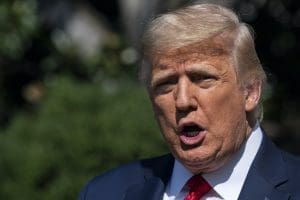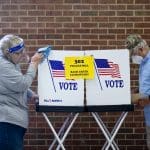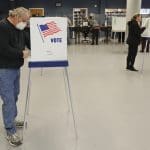Opinion: Trump's attack on the post office is his greatest threat to democracy yet
Republican leaders have been largely silent regarding the administration’s recent attacks on the post office.

In the face of discouraging poll numbers and criticism of his administration’s handling of the COVID-19 crisis, Donald Trump has increased attacks on the legitimacy of November’s elections. He recently threatened not to accept the results of November’s election, stepped up his attacks on mail-in voting, and floated the idea of postponing the election altogether.
The contrast between the public response to Trump’s blatant threat to postpone elections and his slightly more subtle effort to undermine mail-in voting demonstrates why his attack on mail-in voting may be the most effective way for him to delegitimize the 2020 election.
At the end of July, Trump tweeted that the 2020 election would “be the most INACCURATE & FRAUDULENT Election in history.” He then asked: “Delay the Election until people can properly, securely and safely vote???”
Senate Majority Leader Mitch McConnell and House Minority Leader Kevin McCarthy quickly dismissed the possibility of postponing the elections.
McCarthy summarized the Republican response, stating: “Never in the history of the federal elections have we ever not held an election and we should go forward with our election.”
In contrast, Republican leaders have been largely silent regarding the administration’s recent attacks on the post office.
Last week, the postmaster general — and Trump donor — Louis DeJoy reassigned or displaced 23 post office executives, a move that critics charge will make the post office run less efficiently.
Prior to this reorganization, DeJoy announced that postal workers would no longer be able to work overtime, even though the pandemic has increased both the demand for packages and the number of postal workers on sick leave.
DeJoy further exacerbated labor shortages by announcing a hiring freeze.
The combined effects of the coronavirus, DeJoy’s new policies, and the Senate’s failure to pass additional stimulus money for the post office has led to a nationwide disruption of the mail service that threatens the integrity of the 2020 elections.
In an interview on Fox News, Trump admitted that starving the post office of funding would effectively end the push for universal mail-in voting.
This year’s state primaries have already highlighted the difficulties inherent in rapidly increasing participation in voting by mail. In Wisconsin’s presidential primary in April, tens of thousands of ballots arrived after the election date, and 9,000 requested ballots were not received by voters at all.
In New York, two primary races held on June 23 have yet to be called due to difficulties processing mail-in ballots.
In the face of record levels of mail-in voting and chaos within the post office, the United States could see similar problems in November: Thousands of ballots could be sent out too late for voters to use in time, and thousands more could be returned to election offices too late to be counted.
Disruptions in mail service could be particularly problematic because many states, including Colorado, Florida, Georgia, Michigan, and Pennsylvania, require that ballots be received by election officials on or before Election Day, regardless of the postmark date.
The reason Republicans may safely ignore Trump’s attacks on mail-in voting and condemn his threat to postpone elections may have to do with public perceptions about the nature of democracy.
Political scientists at Bright Line Watch, an organization focused on monitoring the state of American democracy, compiled a list of 27 political principles that are necessary to preserve democratic governance. They include tenets under categories such as “Rights” (“All adult citizens enjoy the same legal and political rights”) and “Institutions” (“The judiciary is able to effectively limit executive power”).
The study’s authors asked hundreds of fellow political scientists and other people to rank the 27 principles based on which they thought were the most and least important for maintaining a democracy.
Notably, both experts and nonexperts believed that the most important principle was “Elections are conducted, ballots counted, and winners determined without pervasive fraud or manipulation.”
The fact that so many recognize that free elections are the most important factor in maintaining a democracy makes it hard for Trump to do something that obviously subverts free elections — like postponing a race he is clearly losing.
The study’s authors asked respondents whether the 27 principles were actually being practiced in the United States. Here there was disagreement between experts and nonexperts. While 76% of experts believed that elections, up to this point, have been relatively free of fraud, only 44% of nonexperts agreed.
On the other hand, 60% of the public believed that Americans currently have equal voting rights, while only 37% of experts agreed.
Trump’s claims about mail-in voting play into this public perception that elections in the United States are rife with fraud. This gives Republicans less of an incentive to publicly rebuke Trump’s mail-in voting remarks. Only about 0.0025% of mail-in ballots in the 2016 and 2018 elections were potentially fraudulent.
Delays in the delivery of ballots could leave thousands of people disenfranchised. Trump could also use delays in tallying those ballots to sow confusion and increase voters’ perceptions of fraud.
While absentee voting generally does not favor one party over the other, Trump’s complaints about it may discourage Republicans from voting by mail this election cycle. This raises the potential that some states or races that are close on Election Day after in-person votes are tallied may shift in favor of Democratic candidates over time as the tally of mail-in ballots is added to the totals.
This could tempt Trump to claim that the votes counted later were fraudulent; he tried this strategy in Florida’s highly contested Senate and gubernatorial races in 2018.
In order to combat Trump’s attempts to delegitimize the election, both Democratic and Republican leaders need to remember that the public has a tendency to overestimate voter fraud and underestimate attacks on voting rights.
They need to clearly make the case to the public that threats to the post office are their own form of election fraud.
Voters need to be wary. While it is easy to focus on the more outlandish statements, like threats to postpone the elections, the real threat to democracy will come from the more subtle manipulations of the elections.
Katie Scofield holds a Ph.D. in political science from Indiana University, with a focus on comparative constitutional law. She was awarded a Fulbright grant to study the Ecuadorian constitution and its treatment of human rights. She teaches government at Blinn College in Texas.
Recommended

New group will advocate for increased voting access for Alabamians with disabilities
A national group focused on expanding access to the ballot box for those with disabilities is launching a chapter in Alabama.
By Ralph Chapoco, Alabama Reflector - April 22, 2024
Youngkin blocks Democratic bills dealing with elections
Vetoes affect ranked choice voting and voting rights lawsuits
By Graham Moomaw, Virginia Mercury - April 11, 2024
Lawmakers close in on online voter registration in New Hampshire
New Hampshire lawmakers are inching closer to creating a statewide election portal, a bipartisan proposal that would allow residents to register to vote online.
By Ethan DeWitt, New Hampshire Bulletin - March 15, 2024










































































